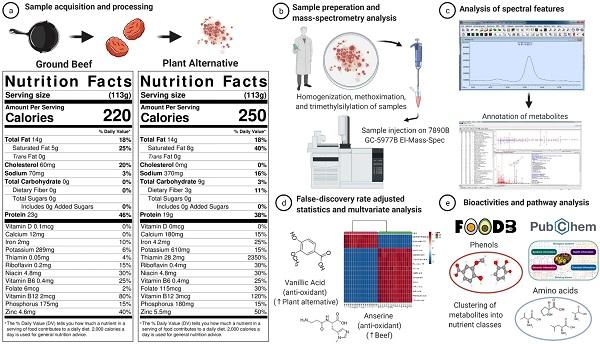
Plant-based meat substitutes taste and chew remarkably similar to real beef and the 13 items listed on their nutrition labels make them seem essentially equivalent. However, research led by Stephan van Vliet, a DMPI postdoctoral student, indicates large nutritional differences between the two. The findings appear in an article in the July 5, 2021 Scientific Reports journal.
The metabolites that the team measured are building blocks of the body’s biochemistry, crucial to the conversion of energy, signaling between cells, building structures and tearing them down, and a host of other functions. There are expected to be more than 100,000 of these molecules in biology and about half of the metabolites circulating in human blood are estimated to be derived from our diets. The Duke Molecular Physiology Institute’s Metabolomics core lab compared 18 samples of a popular plant-based meat alternative to 18 grass-fed ground beef samples from a ranch in Idaho. The analysis of 36 carefully cooked patties found that 171 out of the 190 metabolites they measured varied between beef and the plant-based meat substitute.
“It is important for consumers to understand that these products should not be viewed as nutritionally interchangeable, but that’s not to say that one is better than the other,” said van Vliet. “Plant and animal foods can be complementary, because they provide different nutrients.”
He said more research is needed to determine whether there are short term or long-term effects of the presence or absence of particular metabolites in meat and plant-based meat alternatives.
